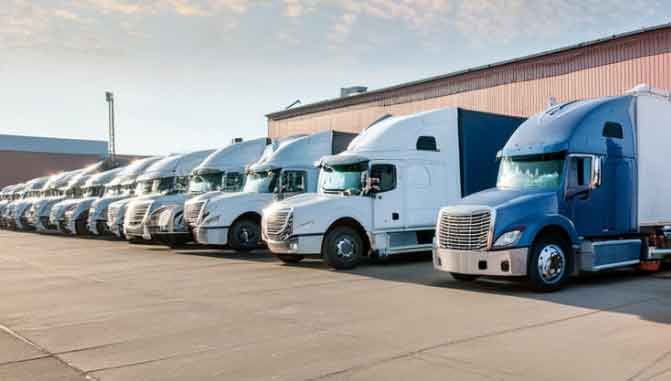How Freight Companies Assist Shippers and Why TLI Excels as a 3PL
Advantages of a 3PL Partner for Freight Management
Freight companies, also known as freight carriers or freight forwarders, play a pivotal role in the supply chain by providing comprehensive logistical services. Among them, TLI stands out as a leading Third-Party Logistics (3PL) provider, offering exceptional freight management services. In this article, we will explore how freight companies assist shippers and delve into why TLI is considered the best choice for shippers looking for effective freight management.

What are Freight Companies?
Freight companies, also known as freight carriers or freight forwarders, are businesses that specialize in the transportation of goods and cargo. They provide logistical services to individuals, businesses, and organizations by arranging the movement of goods from one location to another.
These companies play a crucial role in the global supply chain by facilitating the movement of goods across different modes of transportation, such as road, rail, air, and sea. They handle various types of cargo, including raw materials, finished products, machinery, vehicles, and more.
Freight companies offer a range of services, including:
- Freight forwarding: Coordinating the entire shipping process, including organizing transportation, customs clearance, documentation, and tracking of shipments.
- Warehousing and storage: Providing storage facilities for goods between transportation legs, offering temporary or long-term storage solutions.
- Transportation management: Managing the logistics and transportation aspects of cargo, including route planning, carrier selection, and shipment tracking.
- Customs brokerage: Assisting with customs regulations and documentation to ensure smooth clearance of goods through customs checkpoints.
- Last-mile delivery: Handling the final leg of transportation, delivering goods to the end recipients or businesses.
Freight companies work with a network of carriers, shipping lines, airlines, trucking companies, and other logistics partners to ensure efficient and timely delivery of goods. They may also offer additional services like cargo insurance, supply chain consulting, and inventory management.
These companies cater to a wide range of industries, including manufacturing, retail, e-commerce, automotive, pharmaceuticals, and more. They play a vital role in facilitating global trade and enabling the movement of goods on a domestic and international scale.
Freight Companies
- Expertise and Industry Knowledge: Freight companies bring a wealth of expertise and industry knowledge to the table. They possess a deep understanding of shipping regulations, customs procedures, and transportation logistics. By leveraging their experience, they assist shippers in navigating complex logistics challenges, ensuring compliance, and optimizing freight operations. TLI, as a 3PL, embodies this expertise, providing shippers with invaluable guidance throughout the entire freight management process.
- Efficient Transportation Management: One of the primary ways freight companies assist shippers is through efficient transportation management. They handle various tasks, including route planning, carrier selection, and shipment tracking. By leveraging their vast network of carriers and transportation modes, freight companies optimize shipping routes, reduce costs, and ensure timely delivery. TLI excels in this aspect, utilizing cutting-edge TMS technology and innovative strategies to streamline transportation management for shippers, enhancing efficiency and customer satisfaction.
- Warehousing and Storage Solutions: Freight companies often provide warehousing and storage solutions as part of their services. They offer secure facilities for temporary or long-term storage of goods between transportation legs. Shippers benefit from these services by gaining access to strategically located warehouses, efficient inventory management systems, and value-added services like pick and pack. TLI, as a leading 3PL, boasts state-of-the-art warehousing capabilities, allowing shippers to optimize their supply chain operations and manage inventory with ease.
- Customs Expertise and Compliance: Navigating customs regulations and procedures can be challenging for shippers, particularly when shipping internationally. Freight companies assist shippers by providing customs brokerage services. They possess in-depth knowledge of customs regulations and documentation requirements, ensuring seamless clearance of goods through customs checkpoints. TLI stands out as a reliable partner in this regard, offering comprehensive customs expertise and facilitating smooth customs clearance for shippers through vendor partners.
- Technology and Visibility: Modern freight companies leverage advanced technology solutions to enhance visibility and transparency throughout the shipping process. They provide shippers with real-time tracking, automated reporting, and analytics tools to monitor their shipments' progress. TLI, as a 3PL, harnesses TMS technology, and shipment tracking technology like Descartes Macropoint to offer an intuitive platform that empowers shippers with real-time visibility, allowing shippers & purchasing teams make informed decisions and proactively address any potential issues.
3PL & Freight Forwarder Differences:
While both freight forwarders and Third-Party Logistics (3PL) providers play critical roles in the logistics industry, there are some key differences between them:
Scope of Services: A freight forwarder primarily focuses on arranging the transportation and logistics of goods. They specialize in coordinating the movement of shipments, selecting carriers, handling documentation, and managing customs clearance. Freight forwarders act as intermediaries between shippers and carriers, ensuring the smooth flow of goods from origin to destination.
3PL Provider: A 3PL provider offers a broader range of logistics services beyond transportation. They typically offer end-to-end supply chain solutions, including transportation management, warehousing, inventory management, order fulfillment, packaging, and value-added services along with carrier selection, documentation creation and many of the forwarder tasks. 3PL providers take a more comprehensive approach to logistics, integrating multiple services to optimize the entire supply chain.
Responsibility and Control: Freight forwarders primarily manage the transportation aspect of logistics. They coordinate with various carriers, negotiate rates, and handle documentation. However, they do not typically assume ownership of the goods or take full responsibility for other aspects of the supply chain.
3PL Provider: 3PL providers take on a more significant role in supply chain management. They often take ownership of inventory, handle warehousing, distribution, and provide comprehensive logistics solutions along with coordinating with carriers and negotiating freight rates. 3PL providers assume greater responsibility and control over the entire logistics process, working closely with shippers to optimize efficiency and cost-effectiveness.
Warehousing and Value-Added Services: While some freight forwarders may offer limited warehousing and storage options, their primary focus is on transportation logistics. Their warehousing capabilities are usually geared towards short-term storage or transshipment between transportation modes.
3PL Provider: Warehousing and distribution are integral components of 3PL services. 3PL providers maintain extensive warehouse networks, offering storage solutions for shippers' goods, including long-term warehousing, inventory management, order fulfillment, and value-added services like packaging, labeling, and product customization.
Contractual Relationships: Freight forwarders often work on a transactional basis, engaging in individual shipment arrangements. Shippers may use multiple freight forwarders for different shipments or trade lanes based on their specific needs.
3PL Provider: 3PL providers typically establish long-term partnerships with shippers, focusing on ongoing collaboration and integrated logistics solutions. These partnerships involve contractual agreements where the 3PL provider assumes a broader role in managing various aspects of the supply chain. It is common for TLI clients to partner on a 3-year contractional basis.
It's worth noting that while these distinctions provide a general overview, the line between freight forwarders and 3PL providers can blur, as some companies may offer a combination of services or operate as hybrid entities, adapting to the evolving needs of shippers and the logistics industry.
Long-term 3PL Management Agreements
Signing up with a Third-Party Logistics (3PL) provider like TLI for a longer-term contract, such as three years instead of just one year, can offer several benefits:
- Cost Stability and Predictability: A longer-term contract provides stability and predictability in terms of pricing and costs. By committing to a three-year agreement, you can often negotiate more favorable rates and lock in pricing for an extended period. This helps you forecast and budget more accurately, reducing the risk of sudden cost fluctuations in logistics services.
- Enhanced Service Levels: A longer-term partnership allows the 3PL provider to better understand your business requirements, supply chain intricacies, and unique logistics needs. With a deeper understanding of your operations, the 3PL can tailor their services to meet your specific needs more effectively. This can result in improved service levels, customized solutions, and a stronger focus on meeting your long-term objectives.
- Strategic Collaboration: When you engage in a multi-year contract with a 3PL, it signifies a commitment to a long-term strategic partnership, and ERP software integration. This opens doors for deeper collaboration, joint planning, and the development of innovative solutions to optimize your supply chain. The 3PL provider can invest more time and resources into understanding your business goals and working closely with you to achieve them.
- Continuous Process Improvement: Long-term contracts allow the 3PL provider to implement ongoing process improvement initiatives. With a multi-year commitment, they can invest in technologies, infrastructure, and training programs to optimize your logistics operations. The provider can assess performance, identify areas for improvement, and implement long-term solutions that result in increased efficiency and cost savings.
- Dedicated Resources and Scalability: By committing to a longer-term contract, you can benefit from dedicated resources allocated specifically to your account. The 3PL can assign a dedicated team with expertise in your industry, enabling better coordination, communication, and tailored support. Additionally, a longer contract duration provides the opportunity for scalability and the ability to plan for future growth, ensuring that the 3PL can adapt and accommodate your evolving logistical needs.
It's important to carefully evaluate your specific supply chain requirements, the track record and reputation of the 3PL provider, and consider the potential benefits and risks associated with a longer-term commitment before making a decision.
Freight companies play a pivotal role in supporting shippers by providing comprehensive freight management services. Among them, TLI stands out as a leading 3PL, offering a wide range of expertise, efficient transportation management, state-of-the-art warehousing, customs compliance, and cutting-edge technology solutions. By partnering with TLI, shippers can benefit from a seamless and optimized freight management process, driving their success in the competitive global marketplace.
TLI Insights
Get the latest logistics insights and tips from TLI's award-winning team. Stay ahead in transportation planning.
Questions? Email us at marketing@shiptli.com



